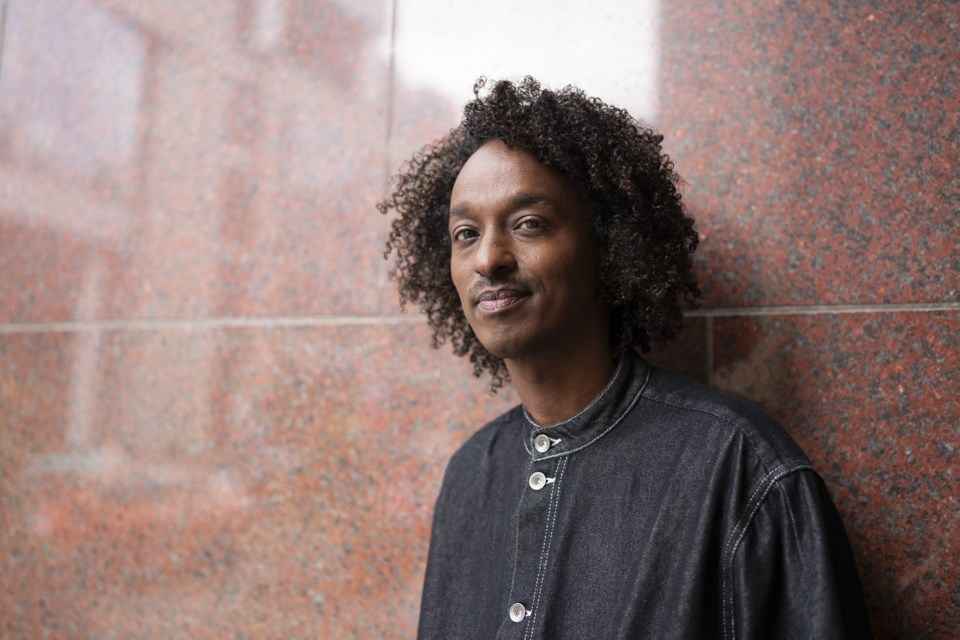TORONTO — K’naan Warsame shot to international stardom in the late aughts with his smash hit “Wavin’ Flag." Not long after, he waved goodbye to the limelight.
“I don't think at the time that I was cut out for that kind of intensity,” the Somali-Canadian rapper and singer says of the chart-topper, which soared beyond airwaves to become Coca-Cola’s promotional anthem for the 2010 World Cup and spurred remixes by stars including will.i.am and David Guetta.
“I still really appreciated the experience and all of that, but it was nuts. It was a lot,” Warsame says.
After dropping his 2012 album “Country, God or the Girl,” he decided to take a step back from the music business. He says he felt drained by the demands of the album release cycle.
“I’ve probably made two albums worth of music since that time, but I just haven’t released it because I lost the energy for putting music out. It just takes so much to be trying to crack through the noise and be like, ‘I’ve got something to hear!” the 46-year-old says on a video call from his New York apartment.
"I want whatever I'm doing for now to be about the work itself and less so about my own identity and history."
Warsame says he’s spent the last decade creating things that don’t require him to be the centre of attention. One of them is his directorial debut “Mother Mother,” which premieres at the Toronto International Film Festival Friday.
The film centres on Qalifo, a widower portrayed by Maan Youssouf Ahmed, and her college-age son Asad, played by Elmi Rashid Elmi, who manage a camel farm in rural Somalia. When Asad learns that his girlfriend has been seeing Liban, an American visitor played by Hassan Najib, tensions escalate into a confrontation that alters the course of their lives.
Warsame says he wrote the movie’s script in October 2020 as an homage to his aunt Qalifo, who was diagnosed with terminal cancer. The main character is loosely based on her.
“As I was dealing with these challenging last months of her life, I was putting her through a challenge in a fictional landscape so I could spend more time with her.”
His aunt died just as filming began in northern Kenya.
Warsame, who has long drawn musical inspiration from his war-torn homeland, says the film is also a tribute to Somali mothers.
“Our mothers are very tough, very loving, very powerful people. You meet any Somali and you talk about a Somali woman or Somali mother, there’s an immediate recognition of what that is,” he says.
“This movie tries to pull back the curtain on that specific and unusual quality to the Somali woman.”
Warsame says he first got the filmmaking bug in 2013 when he did a month-long stint at the Sundance Institute's annual directors and screenwriters labs in Utah.
“I was trying to see if I could tell stories or evoke a feeling through the camera, the way I could do with words and music.”
He says the experience marked a “big shift” for him creatively and he fell in love with the idea of an entire team working together to tell one story.
“It was a less lonely way to work. You just feel like people are like little ants moving a big thing together.”
In 2016, HBO ordered “Mogadishu, Minnesota,” a family drama pilot about the Somali community in Minneapolis written, directed and executive produced by Warsame and executive produced by “The Hurt Locker” filmmaker Kathryn Bigelow. The network announced in 2017 it was not moving ahead with the pilot.
Warsame says he decided to pull the plug on the show after it got swept up in controversy over its subject matter.
“This was before any kind of show was making anything that had to do with complex topics involving Muslims and immigration. The first of something always has a lot more challenges to crack through,” he says.
“I think people were so afraid because there was no precedent for somebody talking about the Somali experience, and more broadly, the Black African Islamic experience.”
Warsame says he opted to wait and make other things rather than move forward with a show “that people were watching with suspicion, not openness.”
He notes he picked up many tools while filming “Mother Mother”— from a deeper understanding of the pacing of a story to the intention behind cinematography — that he can apply to his “next thing.” But he has “no idea” what that thing will be.
He released a track last year called “Refugee,” earning a Special Merit Award from the Recording Academy, the organization behind the Grammy Awards. A new song, “I Come From,” plays during his film’s closing credits. But he can’t confirm whether a new album is in the works.
“I’ve never been this tired in my whole life. I’ve been non-stop,” he says, noting he only wrapped “Mother Mother” in August.
“I'm sure there's something already going in the back of my head. I do want to make another little movie. I'm not really that interested in big things. I like the little kind of guy, the little movies. I have some others in mind,” he adds.
“But music is always there, so we'll see what happens.”
This report by The Canadian Press was first published Sept. 6, 2024.
Alex Nino Gheciu, The Canadian Press



